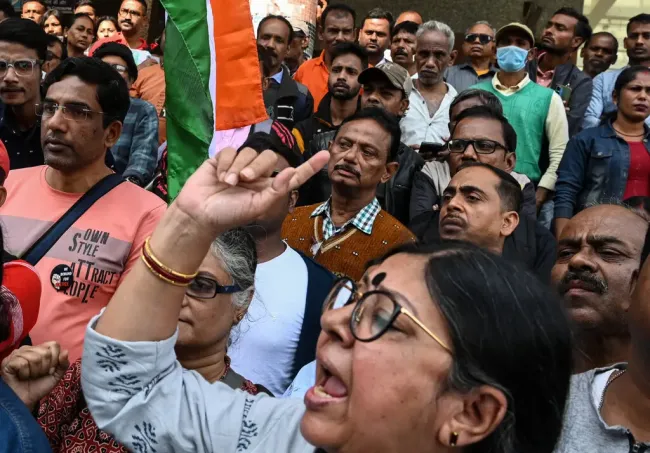Indian Court’s Life Sentence for Sanjay Roy in Kolkata Doctor Rape-Murder Case Sparks Outrage: “Justice Denied!”
On January 20, 2025, a Kolkata court sentenced Sanjay Roy, a former civic volunteer, to life imprisonment for the brutal rape and murder of a 31-year-old trainee doctor at R.G. Kar Medical College and Hospital. The court’s decision to forgo the death penalty has sparked nationwide outrage, with many calling it a miscarriage of justice. Despite calls for capital punishment from the victim’s family, the Central Bureau of Investigation (CBI), and West Bengal Chief Minister Mamata Banerjee, the court ruled that the crime did not meet the “rarest of the rare” criteria required for execution.
A Crime That Shocked the Nation
The victim, a dedicated postgraduate trainee in chest medicine, was found dead in the hospital’s seminar hall on August 9, 2024. Autopsy reports revealed she had been raped and strangled, with evidence indicating she fought valiantly against her attacker. This horrific crime sent shockwaves across India, sparking months of protests by doctors, students, and citizens demanding justice and an end to violence against women.
Sanjay Roy, a former volunteer with the Kolkata Police, was arrested a day after the crime. Forensic evidence, including DNA and CCTV footage, irrefutably linked him to the attack. Despite this, Roy pleaded innocence, claiming he was framed and that his confessions were coerced. The court, however, rejected these claims and convicted him under Sections 64 (rape), 66 (causing death), and 103(1) (murder) of the Bharatiya Nyaya Sanhita (BNS).
A Controversial Verdict
Judge Anirban Das of the Sealdah Court described the crime as “heinous” but ruled it did not meet the “rarest of the rare” standard for the death penalty. Instead, Roy was sentenced to life imprisonment without parole and fined ₹50,000. The court also ordered the West Bengal government to pay ₹17 lakh in compensation to the victim’s family—a gesture the victim’s father dismissed as “blood money” that could never replace his daughter.
The verdict has been met with widespread condemnation. Women’s rights activists, protesters, and the victim’s family have criticized the court’s decision, arguing that only the death penalty could serve as a fitting punishment for such a heinous crime. Even Chief Minister Mamata Banerjee, who had strongly supported the investigation, expressed her disappointment, reiterating her call for capital punishment.
Systemic Failures Exposed
This case has highlighted glaring weaknesses in India’s justice system and reignited debates over women’s safety. Many have questioned how a crime of such brutality failed to qualify as “rarest of the rare.” Critics argue that the verdict sends a dangerous message, implying that even the most horrific acts of gender-based violence may not face the harshest consequences.
The case also raises concerns about systemic inefficiencies, the handling of evidence, and the influence of political and bureaucratic pressures. For many, the failure to impose the death penalty reflects a broader disregard for the safety and dignity of women, especially in professional settings where they are increasingly vulnerable to harassment and violence.
Timeline of the Case
- August 9, 2024: The victim’s body is discovered in the seminar hall of R.G. Kar Medical College and Hospital.
- August 10, 2024: Sanjay Roy is arrested based on forensic evidence and CCTV footage.
- November 11, 2024: The trial begins in a Kolkata court.
- January 18, 2025: Roy is convicted of rape and murder under Sections 64, 66, and 103(1) of the BNS.
- January 20, 2025: Roy is sentenced to life imprisonment and fined ₹50,000—a verdict that has enraged the nation.
The Fight for Justice
The sentencing of Sanjay Roy has left the victim’s family and millions across the country disillusioned. While the verdict provides legal closure, it falls short of delivering the justice the victim deserved. This case serves as a grim reminder of the systemic failures hindering India’s fight against gender-based violence.
As Roy prepares to appeal the verdict, the victim’s family and supporters have vowed to continue their fight. Their message is resolute: this is far from over. Until every perpetrator of such crimes is held fully accountable, and women can live without fear, justice will remain elusive.
